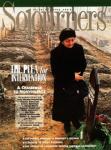Reggae is music of the oppressed. Its performers rarely have formal musical training and usually compose lyrics depicting the life realities -- especially poverty and social injustice -- of the suffering.
Reggae is also rooted in the musical styles of the oppressed, of the slave descendants in both the United States (rhythm and blues) and Jamaica (ska and rock steady). Although most often associated with Jamaica, reggae is being taken back to its African roots. Alpha Blondy is one African who has gained international recognition for his unique reggae music.
Born in the Ivory Coast, Alpha Blondy (his nom-de-plum means "First Bandit") was strongly influenced by the music of Jamaica, especially that of Bob Marley. And the influence of Marley is evident in Blondy's music. Like Marley, Blondy's simple style is reminiscent of the lifestyles of the Jamaican and African cultures. Also like Marley, and typical to most reggae musicians, Blondy makes frequent reference to the tenets of Rastafarianism, the religion of choice for most reggae artists.
Despite the similarities to Marley, Blondy's style is unique. For example, unlike most reggae artists, he directly incorporates his own indigenous musical traditions to create a distinctly African sound. Also, he sings in several different languages, including English, French, Hebrew, Arabic, Dioula, and Jamaican Patois. By using so many languages, Blondy depicts the unity of all peoples, as well as the conviction of shared responsibility in the social ills of our day.
ON HIS latest album, The Best of Alpha Blondy, this African musician gives the listener a taste not only of diversity in language, but also in subject matter. The first track of the album, "Cocody Rock" (originally from the album of the same title), serves as an introduction: Artists from Ivory Coast prepare their music to rock the listener's soul. The rest of the album does just that -- spiritually, musically, and politically.
"Jerusalem," the title track of his third album, is a soothing spiritual song with introductory instrumentals evoking images of a serene river at dusk. A mesmerizing beat carried by the guitar adds a meditative quality to the piece which directs the listener toward worship. In addition to things spiritual, Blondy also sings of police brutality, apartheid, and his affection for Paris.
"Apartheid is Nazism" (from the album of the same title), though one of Blondy's more celebrated songs, lacks the appeal of other cuts on this recording due to the tedium of the chorus: "America break the neck of this apartheid." Too, the chorus is questionable in concept. One wonders if American intervention would bring positive resolution to apartheid in South Africa. The chorus is unorthodox for Rastafarianism, which usually refers to the United States as Babylon -- an evil to be avoided whenever possible.
In the music world, however, it is nearly impossible to avoid the Western Babylon and be successful. Alpha Blondy achieved popularity in Western Africa in the '80s with the recording of his first single. Recognition of his music spread from Africa to Jamaica and on to Europe when Blondy recorded with the Wailers at Tuf Gong studios in Jamaica. (Five tracks on The Best of Alpha Blondy are recorded with the Wailers, while five are with Blondy's own band, The Solar System.)
Blondy's music is becoming increasingly popular in the United States. The Best of Alpha Blondy and four other albums -- the aforementioned Apartheid is Nazism, Cocody Rock, Jerusalem, and Revolution -- are being distributed by the American company Shanachie.
As the U.S. ear learns to appreciate the unusual guitar-kept beat typical of reggae, and music with lyrics in dialects we do not understand (Shanachie could help us here by providing lyrics and translations to Blondy's music), Americans may begin to gain better understanding of the lives of the suffering in Jamaica and Africa. Reggae music is one more protest by our brothers and sisters, and the music of Alpha Blondy serves ably as a voice in that protest.
Caroline Buck-McClure was assistant subscription manager of Sojourners when this review appeared.
The Best of Alpha Blondy. Shanachie, 1990.

Got something to say about what you're reading? We value your feedback!
